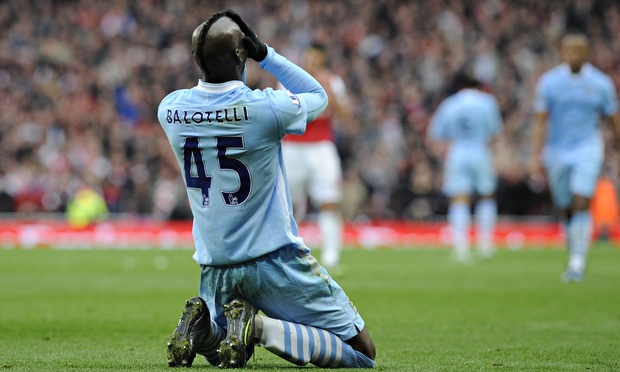From Fontaine’s goal glut to Balotelli’s birdbrained dismissal, half a dozen pieces of bad luck that were actually good luck

1) Bliard gets injured in a pre-World Cup warm-up
Kopparberg is a small Swedish town that has become famous for lucrative bungling. It was here that the Treskilling Yellow was minted in 1857. Enough said. What? Oh right. The Treskilling Yellow is a postage stamp and it was supposed to be like all the other three-skilling stamps that Sweden was producing back in the early days of mailing yonder – ie it was supposed to be painted blue and green – but one accidentally came out yellow. The horror! Happily, no one noticed at the time and the stamp was allowed to proceed with its normal stamp duties. Even more happily, years later its uniqueness led to it being coveted by collectors and it is now considered one of the most valuable stamps in the world, worth several million pounds, which, yes, makes it a more costly stamp than anything ever produced by Martin Skrtel or Diego Costa. Even now, every 13 July Kopparberg holds a little festival to commemorate the Treskilling Yellow.
So Kopparberg has a history of mishaps turning out nicely. But René Bliard might not agree. He was the France striker who injured his ankle in a pre-World Cup warm-up match against a Kopparberg side in 1958. He had headed to Sweden in top form, having just won the League and Cup double with Stade de Reims, but his ankle blow forced him to miss the tournament. So France decided to give a rare start to another forward instead – a certain Just Fontaine.
Fontaine also played for Reims and had scored more than twice as many league goals as Bliard that season (34 compared to 15), but he had made little impact with his country. Going into the World Cup Fontaine had played only five times for France in the previous five years and he had looked strangely skittish during the warm-up matches. After being told that he would be starting instead of the injured Bliard, the first thing Fontaine needed to do was source some proper footwear: he kept slipping during the warm-up games because the studs on his boots were completely worn out. So for France’s first World Cup match he had to borrow a pair off Stéphane Bruey. He scored a hat-trick in the 7-3 victory over Paraguay.
Fontaine benefited from excellent service from another Reims player, Roger Piantoni. Even more fruitfully, he also struck up an immediate understanding with Raymond Kopa, the Real Madrid schemer who was re-introduced as the France playmaker after missing all the qualifiers. The duo roomed together during the tournament but it was only on the pitch that they were in tune with each other. “I didn’t know Raymond as a person,” recalled Fontaine in an interview years later. “It was bizarre because he was used to Spanish time so he would go to bed two or three hours after me and I would get up much earlier than him … so we were out of synch and didn’t see each other much. But on the pitch …”
After his hat-trick against Paraguay Fontaine scored both France’s goals in the 3-2 defeat by Yugoslavia before he and Kopa scored in the 2-1 win over Scotland. He struck with a header against Northern Ireland before adding a second in a 4-0 win following another cutting through-ball from Kopa. “This is a different Fontaine,” wrote L’Equipe. “A Fontaine full of audacity and courage. A Fontaine whose whole being seems transformed.” France would need him to remain in that form in the semi-final against Brazil, who had not yet conceded in the tournament. Vava scored for the Brazilians in the second minute but Fontaine soon equalised. Brazil were too strong (and quite violent), however, and ran out 5-2 winners, with Pelé hitting a hat-trick. France went on to claim third place by walloping West Germany 6-3, with Fontaine plundering another four goals to bring his personal tally for the tournament to 13, a record that may never be beaten, although with the way Fifa seem intent on expanding the World Cup, we can’t rule it out.
2) Leeds United suffer two home defeats in a week to their bitterest rivals
In the 1991-92 season, the Uniteds of Leeds and Manchester were locked in battle on three fronts. They drew both their league meetings 1-1 before the turn of the year to leave the title race delicately poised between the pair, and then they were pitted against each other in both domestic cup competitions. Both ties were to be played at Elland Road. The first came on 8 January in the quarter-final of the League Cup and it started well for Leeds, as Gary Speed swept them into the lead with a trademark left-footed shot into the roof of the net. But before half-time Clayton Blackmore equalised with a sumptuous long-range free-kick. Andrei Kanchelskis switched to a centre-forward role for the second half and put the visitors in front by finishing nicely after a through-ball from Ryan Giggs, who made it 3-1 a little later as Manchester United took control. A week later the teams went head to head in the third round of the FA Cup and the visitors again emerged triumphant, Mark Hughes scoring the only goal.
Leeds were still top of the league table but only by a point and Ferguson’s team had two games in hand, having begun to accumulate a backlog owing to their participation in the European Cup Winners’ Cup and the Super Cup earlier in the campaign. That backlog and the nerves of trying to end Manchester United’s epic wait for a league title began to take a toll. They may have been knocked out of the FA Cup in the fourth round (though only after a replay with Southampton) but the Mancunians went all the way in the League Cup, winning it for the first time, and that meant that they contested another 24 matches in the season after their second win at Elland Road, while Leeds played only 17. Injuries and jitters piled up along with the fixtures, as Ferguson’s side found themselves having to play four matches in a 10-day period in March and then five in an 11-day run in April, starting with the League Cup final. They beat Nottingham Forest at Wembley and then won at home to Southampton in the league but they could only draw with Luton Town in their next match before losing to Forest at Old Trafford in the league, to West Ham away and then falling 2-0 to Liverpool at Anfield. Leeds, by contrast, held their nerve and finished with four wins and a draw from their last five matches of the season to ensure they had the last laugh, winning the league by four points.
3) Cratz is told he is about to lose his job
When, in July 2001, the board of the Swedish top-flight club Hammarby announced that they would not renew Soren Cratz’s contract as manager at the end of the season, they were expecting gratitude. Not from Cratz, obviously, but from the fans who, according to the board, were being turned off by Cratz’s allegedly boring style of play, which the suits said suffered in comparison with the slick brand of play being pioneered at the time by another Stockholm side, Djurgardens.
Cratz, who had made his name several years previously by leading modest Norrkoping on a record 26-game unbeaten home streak during which they scored 74 goals and conceded just 15, was outraged at the slur on his style. “To say that I am a manager who plays only long balls is bullshit,” he blasted with Route 1 directness. “I want to do the best with the players I have got available,“ he continued. “That is what makes a manager good, to see what the players can and cannot do.”
Fuelled by righteous indignation, in the first game after the announcement of the non-renewal of his contract, Cratz took his team to Helsingborgs and they sashayed to their biggest away win of the campaign. The 3-1 victory had the critics cooing. “After the win against Helsingborg [the journalist] Mats Olsson wrote that if Hammarby play much more entertaining football than this, people will laugh so hard on the terraces that they will die,” said Cratz. “Anders Linderoth, who was taking over [from me], said: ‘You can’t play more entertaining football than this.’ I don’t think they [the board] liked me as a person. I think that was what it was all about.”
Cratz seemingly resolved that the best way to get his own back was to ridicule the notion that his style was unpopular – he did that by inspiring an end-of-season charge that brought Hammarby the title for the first time in their history, finishing a point above those hifalutin’ hipsters from Djurgardens. It was the finest achievement in Cratz’s career. But he was let go anyway at the end of the season. He was not out of work for long as Helsingborg snapped him up, saying, funnily enough, that he would prove an antidote to Nanne Bergstrand, Helsingborgs’ previous manager whose tactics were branded “cowardly” by the club’s board.
While the announcement of his sacking turned out to be a blessing in disguise in view of the unprecedented success it provoked, fortune still had another, less joyful twist in store for Cratz. When he went back to Hammarby as manager of Helsingborgs the following season, he lost 3-1 with his new team but received a hero’s reception from the home fans. Cratz got rather swept up in it all and embarked on a lap of honour at the end of the game, milking the adulation of the fans he had once been accused of turning off. That, however, riled fans of his new team, who descended on their club’s training ground the next day waving banners such as “‘who pays your wages – Helsingborgs or Hammarby?”. That night the Helsingborgs board convened a meeting – at which Cratz was unceremoniously sacked.
4) Balotelli gets sent off
It was a red card that looked a lot like a white flag. Mario Balotelli’s dismissal for a senseless foul on Bacary Sagna at the end of a 1-0 defeat at Arsenal in April 2012 seemed to confirm Manchester City’s surrender in the title race. City had been five points clear at the top of the table a month previously but their form had nosedived and the loss at the Emirates left them eight points behind United with just six matches to play. But, as it transpired, Balotelli’s sending off following what Daniel Taylor described in these pages as “a dangerous, chaotic, birdbrain performance” helped stimulate a dramatic turnaround. Because it led to the timely reintegration of Carlos Tevez, who for most of that season had been far more problematic than Balotelli.
While Roberto Mancini had a long fuse when it came to Balotelli, he went nuclear on Tevez pretty quickly. The Argentinian’s apparent refusal to warm up with a view to coming on in a Champions League tie at Bayern Munich in late September 2011 led Mancini to declare he would never play for the club again. Tevez was fined, suspended, bad-mouthed across the land and sentenced to several weeks of intensive golf-playing back home interspersed with occasional moaning to the Argentinian press. A fat lot of good it was doing anyone. After four months of low farce and no transfer for Tevez despite willingness from both sides to move him on, the player resumed training with City. In February Mancini announced the hatchet was buried. But it was not until Balotelli’s suspension that Tevez was given another league start. He duly scored in a 4-0 win over West Bromwich Albion and teed up another for Sergio Agüero. The Argentinian duo reinvigorated City’s attack and their title challenge, with Tevez scoring a hat-trick in the next game, a 6-1 win at Norwich City. City won all six of their remaining matches after the defeat at Arsenal, including a 1-0 win over United. Tevez started all those games, though Balotelli did return to make an important contribution in the final match of the season against Queens Park Rangers, setting up the winning goal for AGUEROOOOOOOOOOOOO.
5) Liverpool fail to sign Dempsey
It looked a good match in 2012: a dynamic goalscoring midfielder and a Liverpool side attempting to rebuild by hiring a proven scorer to ease the burden on Luis Suárez. And Liverpool’s American owners were so excited at the prospect of signing the USA international Clint Dempsey that they got ahead of themselves and a post on the Fenway Sports Group’s news website announced that Dempsey had joined the club. Fulham immediately retorted by pointing out that, er, no he hadn’t. The Cottagers added that a bid had not even been received for their player. That was news to Brendan Rodgers, who had thought a deal was close and had let Andy Carroll go in the belief that a more suitable goal-getter was on the way. It turned out that Liverpool were haggling over the fee, unwilling to pay £6m for a 29-year-old. Rodgers was said to be furious, and so were the clubs’ fans, with the internet ablaze with Liverpool fans calling for the head of the club’s managing director, Ian Ayres, when Dempsey ended up joining Tottenham Hotspur instead.
Rodgers had tried to smooth things over by offering Fulham Jordan Henderson as part of the deal for Dempsey. Fulham were keen, but Henderson dug in his heels and vowed to stay and fight for his future at Anfield. Now that he has become one of the club’s most influential midfielders and the most likely replacement for Steven Gerrard as permanent captain, that looks a mighty good thing for Liverpool. Dempsey, as it turned out, failed to cut it at Spurs and was soon shunted on to Seattle Sounders. By then Liverpool had forgotten all about him, as not forking out for him the previous August had enabled them to buy Daniel Sturridge the following January. So by missing out on his top transfer target in the summer, Rodgers eventually got the goalscorer to complement Suárez, and kept the club’s future captain.
6) Greece get clobbered by Finland
As our friend Cratz explained above, a good manager must be adaptable rather than dogmatic. He must be able to figure out what his players can and cannot do, and then come up with an appropriate plan.
Otto Rehhagel was given a very quick demonstration of what his players could not do after he was appointed manager of Greece in August 2001. He got the gig largely on the basis of his extraordinary success at Kaiserslautern, who under him became the first side to win the Bundesliga in the first season after promotion – and they did it while playing with devastating attacking panache. If Rehhagel fancied attempting that approach with Greece, his first match suggested a rethink would be in order: Greece went to Helsinki for a World Cup qualifier and were tonked 5-1.
Rehhagel realised his team needed to tighten up. The improvement was immediate, as a month later Greece played with solidity and vitality away to a team that needed to draw to reach the World Cup: in the end Greece were only denied victory by a last-minute free-kick from David Beckham. England went to the World Cup, but it was Greece, despite finishing fourth in the five-team qualifying group, who were on the path to glory.
The team that conceded 17 goals in eight qualifiers for the 2002 World Cup reached the 2004 European Championship finals by topping a group that included Spain, conceding only four goals in eight games. Rehhagel had found a method and the players were fully onboard. Still, no one mentioned them as potential tournament winners. But Greece went on to complete one of the most amazing triumphs in the history of international football, twice beating hosts Portugal on the way to being crowned European champions without conceding a single goal in the whole of the finals.





